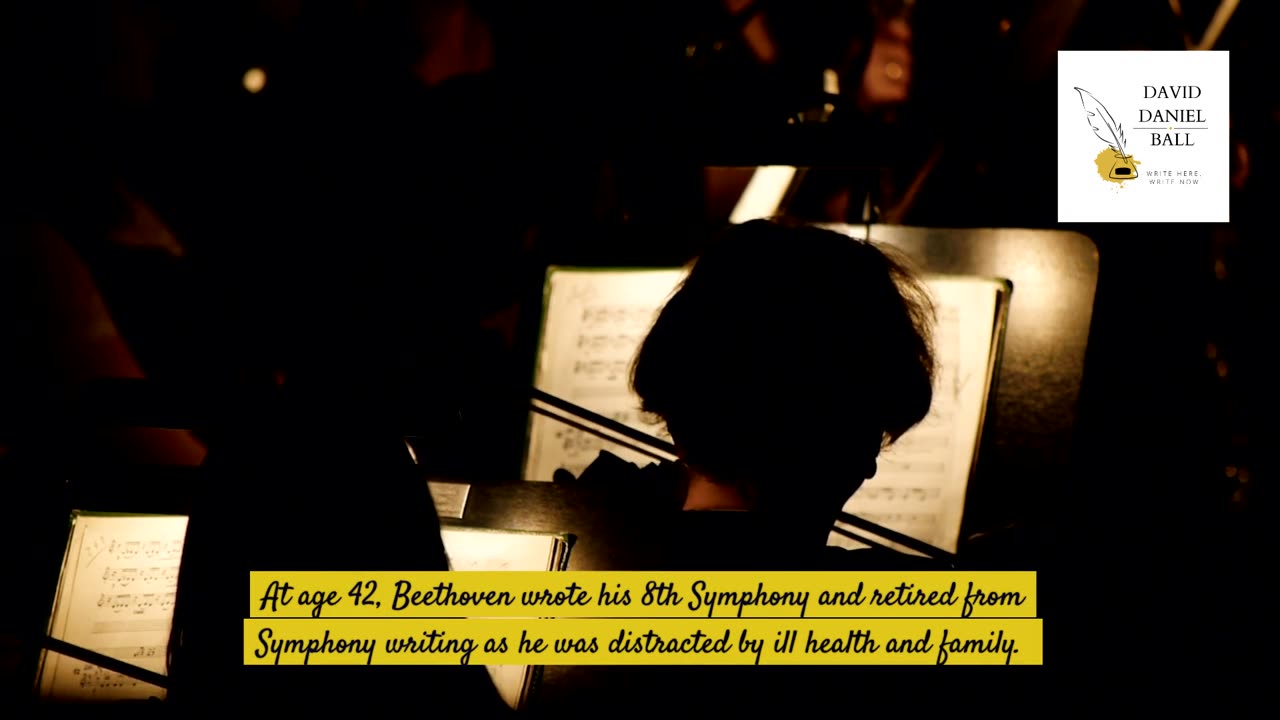Premium Only Content

Beethovens Magnum Opus
an updated retelling of https://rumble.com/v16k3kf-a-deaf-musicians-magnum-opus.html
A Pictory.ai video
Beethoven's Ode to Joy
He had been profoundly deaf for years. But he also suffered from tinnitus. He heard a persistent discordant buzzing, constantly.
His muse was music, from a young age. Before his afflictions, he was devoted to music and suffered for it. His Grandfather was a noted musician. His father could sing, but was a drunk. His father began teaching him music from age 4, hoping he would emulate Mozart. Beethoven played music to raise money for his dad.
Beethoven was boisterous and had many friends. At age 17, Beethoven travelled from Bonn to Vienna to work with Mozart. Beethoven cut short his trip as his mother was sick. But, 5 years later, he left for Vienna again, and learned from Haydn.
At age 28, in 1798, Beethoven became aware of tinnitus and growing deafness. At first, the upper registers grew faint. The tinnitus was debilitating. He sought cures.
At age 32, in 1802, Beethoven wrote of his thoughts of suicide from his growing
Deafness. He had been advised there were no cures, and that his deafness would grow worse.
At age 42, Beethoven wrote his 8th Symphony and retired from Symphony writing as he was distracted by ill health and family. His nephew Karl, he tried to help, but Karl had an independent spirit.
Beethoven had retired from Symphony work, but he continued with music and wrote prolifically. Even so, he was approached to write a symphony based around an artwork. It appealed to him.
To showcase his Symphony, which featured voices used as instruments, Beethoven mentored a young female soloist.
On 7th May 1824, Ludwig van Beethoven directed his 9th Symphony. He had been profoundly deaf at this time, and his orchestra was actually directed by another, off stage. Beethoven was a few measures behind come the finale and that young female soloist turned him around so he could see the applause. It was the first recorded Mexican Wave, with gentlemen throwing their hats in the air.
Here are the words, and it is worth noting why Beethoven attempted the work.
Oh friends, not these sounds! Let us instead strike up more pleasing and more joyful ones!
Joy!
Joy!
These words echoed his 1806 “"Let your deafness no longer be a secret – even in art."” and “"seize Fate by the throat; it shall certainly not crush me completely"”
Ode to Joy has become Europe’s official anthem.
The ninth Symphony of Beethoven was the first to use voices as instruments, rather than narrative.
More than the music of the Symphony was the spirit of Beethoven. He had lost his love and joy with his hearing. But that was not the end of the conversation. People talk about faith and hope in God. Beethoven knew he would not experience his joys of life. But he kept la joie de vivre. Like many of his time, Beethoven was not profoundly religious.
Giuseppe Verdi, 1878 “The alpha and omega is Beethoven's Ninth Symphony, marvellous in the first three movements, very badly set in the last. No one will ever approach the sublimity of the first movement, but it will be an easy task to write as badly for voices as in the last movement. And supported by the authority of Beethoven, they will all shout: "That's the way to do it..."” Did Verdi miss that the instrument Beethoven used, the voice, was different to other musical instruments?
https://voiceddb.locals.com/post/2204775/about-the-deaf-musicians-greatest-work
-
 2:51
2:51
Faith and Philosphy
2 years agoThe Renaissance, love, Petrarch and Cyrano De Bergerac
64 -
 22:45
22:45
Brewzle
13 hours agoI Went Drinking In A Real Bourbon Castle
25.9K3 -
 48:36
48:36
PMG
1 day ago $1.87 earned"Parkland Parent Speaks Out On Kamala Harris Using Victims"
19.2K3 -
 4:06
4:06
The Lou Holtz Show
12 hours agoCoach Lou Holtz’s Heartfelt Christmas Message 🎄 | Family, Faith & Notre Dame Spirit 💚 #christmas
14.5K -
![ROSEANNE BARR - Her Journey, TRUMP, and the MAGA GOLDEN AGE! [INTERVIEW]](https://1a-1791.com/video/s8/1/M/m/B/2/MmB2v.0kob.1-small-ROSEANNE-BARR-Her-Journey-T.jpg) 51:35
51:35
Dr Steve Turley
1 day ago $17.95 earnedROSEANNE BARR - Her Journey, TRUMP, and the MAGA GOLDEN AGE! [INTERVIEW]
49.9K50 -
 57:38
57:38
The Tom Renz Show
10 hours agoMerry Christmas - The Tom Renz Show Christmas
87.8K16 -
 2:59:10
2:59:10
Wendy Bell Radio
20 hours agoThe Bridge Too Far
166K301 -
 1:03:45
1:03:45
Donald Trump Jr.
1 day agoHappy Festivus: Airing Our Grievances and Stopping The Swamp w/Sean Davis | TRIGGERED Ep.201
426K546 -
 1:30:30
1:30:30
Game On!
1 day ago $7.95 earnedTop 5 things you need to know for Sports Christmas!
74.3K5 -
 1:58:10
1:58:10
Robert Gouveia
1 day agoMatt Gaetz REJECTS Report, Sues Committee; Luigi Fan Club Arrives; Biden Commutes; Festivus Waste
297K234